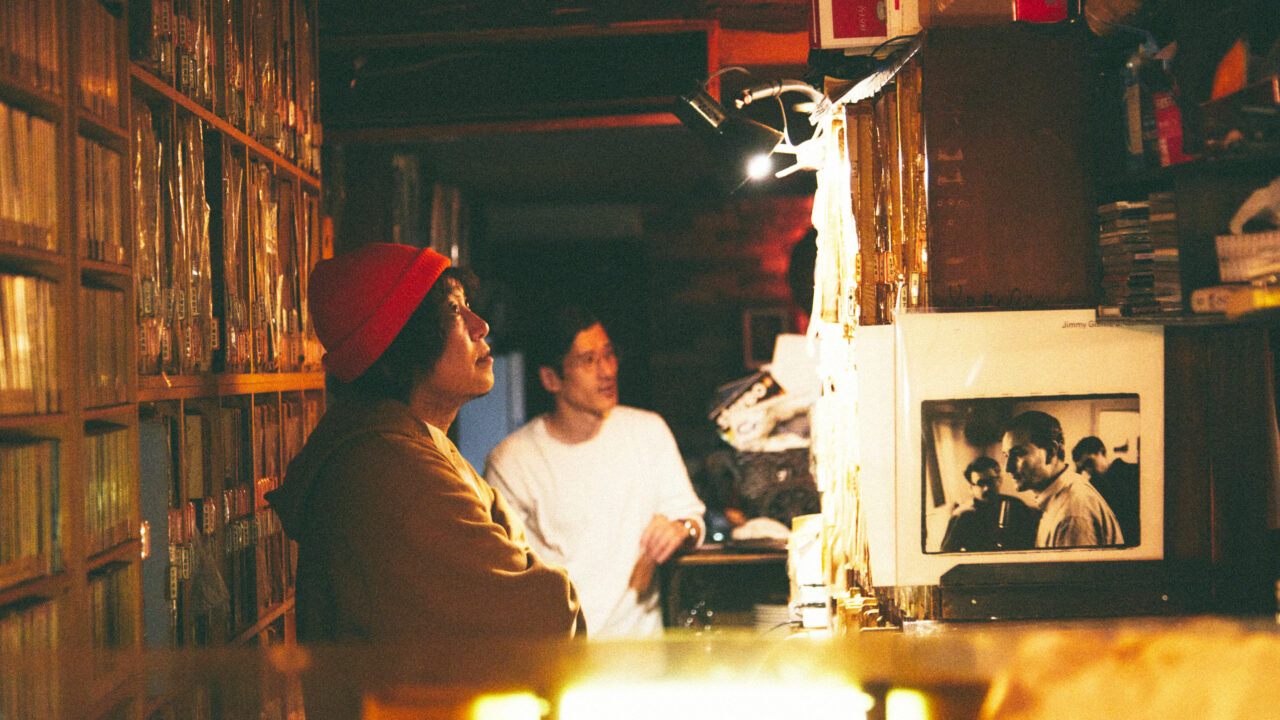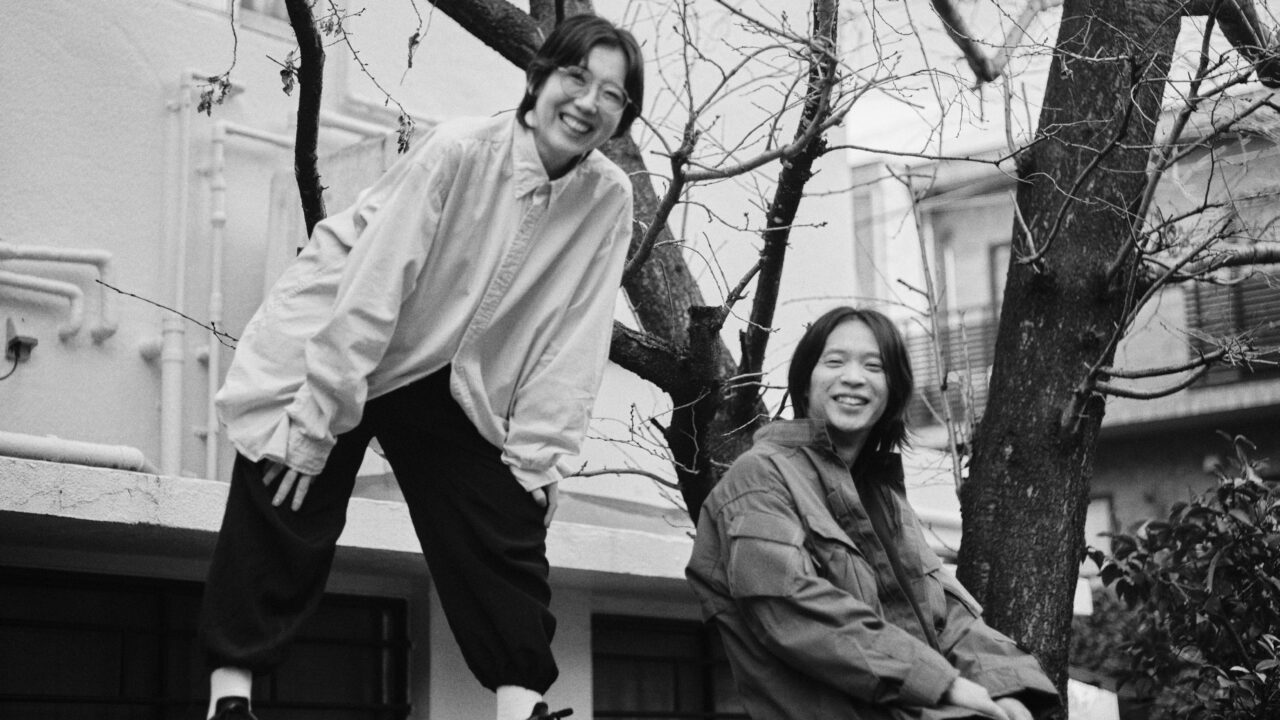As the title suggests, the characters in the movie “People Who Talk to Plushies Are Kind” (also known as “Nuishabe”) talk to Plushies. They do this because if they talk to others about what they find painful, the other person might be hurt. Even so, they feel that they have to talk about it. That is why they talk to Plushies. This seemingly very personal activity is at the same time a social activity. The members of the “Plushies circle” seem to share their prayers for a world in which people can breathe more easily with their Plushies, in their own words. In her first interview with NiEW, Yurina Kaneko reveals the multifaceted appeal of the director herself and the film “Nuishabe”. The director’s first interview with NiEW will reveal the multifaceted charm of the director herself and the work “Nuishabe”.
INDEX
Created a collection of short stories as an elementary school student. A Childhood of Facing Stories
First of all, I would like to ask you about yourself, Director Kaneko. I heard that you were writing novels before you started making films. Were you always interested in creating stories?
Kaneko. At first, I started creating stories as if I was talking to myself. According to my family, I started making up stories when I was in kindergarten by playing with my fingers and talking to myself before going to bed.
After that, I started writing novels, and by the time I was in elementary school, I had created a collection of short stories called “On the Way to School.
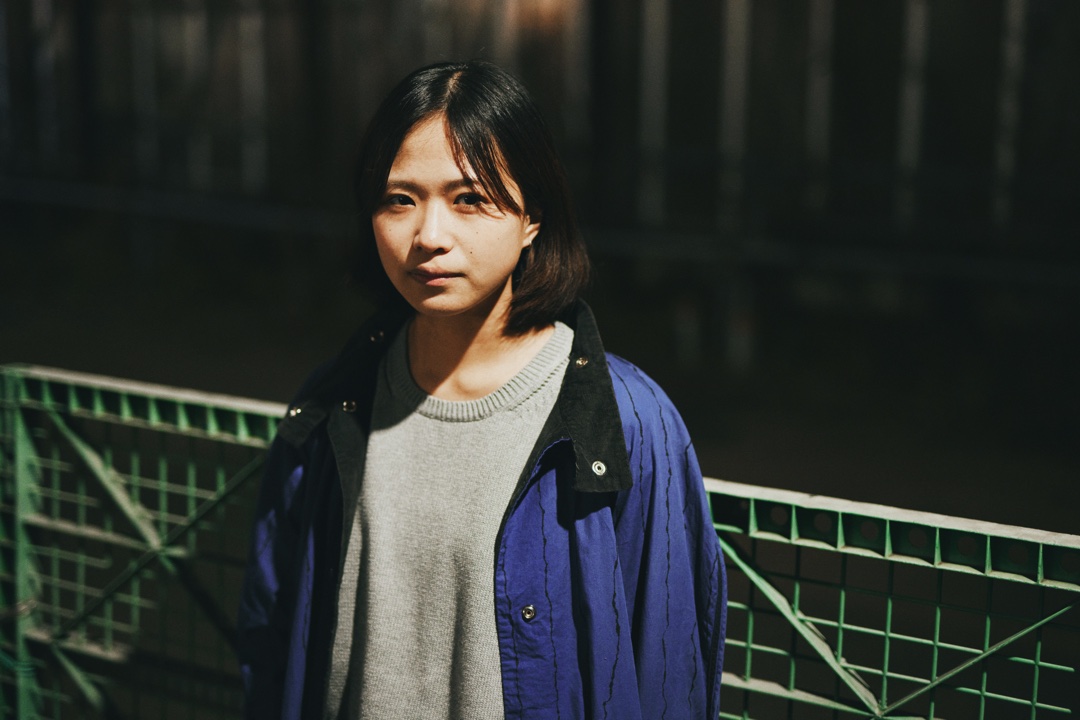
Born in Tokyo in 1995. Graduated from the School of Film and New Media, Ritsumeikan University. A member of Ritsumeikan University’s film club, she has produced many music videos and films. Her independent film “Strolling Plants” (2019) was selected for an award film at the 41st Pia Film Festival. Her feature film “Sleeping Insects” won the Grand Prix at Muzik Lab 2019. Her latest film, ” People Who Talk to Plushies Are Kind ” will be released on April 14, 2023.
ーIt’s amazing that you’ve been putting together a collection of short stories from the beginning. What was “On the Way to School” about?
Kaneko. I really liked the writer Hoshi Shinichi, so it was a follow-up to that.
When I reread my own work as an adult, I found that there were some aspects that were consistent with my current style. There is a piece about the difference between closing one’s eyes and blinking, and there is a story about an artist who draws sticks continuously. I realized that I had been a “noticer” since I was a child.
ー I like the idea of being a “notice-maker” who is aware of the subtleties of the world. Did you ever think of becoming a novelist?
Kaneko. Yes, I did. When I was in the middle of elementary school, there was a time when I went to and from school with someone who was older than me, like an older sister, and she told me a lie: “All novelists commit suicide, so you shouldn’t do it. But I took it seriously at the time. After that, I stopped writing novels for a while.

ー That happened to you. Did you continue your expressive activities after that?
Kaneko. In junior high and high school, I only played basketball. I went to morning practice every day without a doubt. I was working hard with a “let’s go to the nationals” kind of spirit. We were a weak team and actually came in 9th in the district or something (laughs).
ー So you didn’t have much to do with film in your life?
Kaneko. No, I really liked movie theaters as a place even back then. I think it was partly due to the influence of my father (film director Shusuke Kaneko), but I grew up in an environment where going to the movies on my days off was very natural.
Movie theaters, where I could encounter all kinds of things, were like an amusement park for me, and I found them to be a lot of fun. With this background, I decided to join the film club when I was deciding which club to join in college.
ー So that’s how you started making movies.
Kaneko. At first, I had no intention of making a film by myself, but the head of the club at the time told me, “Anyone can make a film, so make one. When I actually made a film and showed it at a festival, the audience laughed out loud at the film I made.
It was a university event, so there were only one or two people in the audience, but I was so moved that I thought, “My film is making someone’s muscles move! I was so moved. I think that is still the driving force behind my filmmaking today.
I was confronted for the first time with my own perpetration. The Terrifying Fascination of the Original Story “Nuishabe”
ー I get the impression that you is very conscious about the choice of words in your films.
Kaneko. That’s right. In my previous films, I made them as if I were visualizing “my own internal poetry,” so I adopted dialogue that was difficult to understand from an objective point of view, thinking that someone else might be able to sense the poetic sentiment in it.
ー Your new film “People Who Talk to Plushies Are Kind” is an adaptation of Awao Omae’s original novel. Were there any points you were conscious of or difficulties you faced in adapting words written by someone other than yourself?
Kaneko. Unlike my previous works, the emotions of each of the characters were already present in this film, so I thought my words were not necessary for the film.
What was difficult was that I had to incorporate words that I did not want to use in the film. For example, “Women should just smile. Even though I didn’t want to say these words myself, I had to make the characters say them because they were their true feelings. It was difficult to keep that distance.
“People Who Talk to Plushies Are Kind” Trailer
Synopsis: The protagonist of the story is a college student, Nanamori, who struggles with “Am I the only one who can’t enjoy love?” The protagonist is Nanamori, a university student who is not good at the masculine/feminine side of life and is distressed that “I’m the only one who can’t enjoy romance? The story is set in the university’s “Plushies circle” and portrays Mugito, who has a heart-to-heart with Nanamori, and the people around them.
ー Did you have a chance to discuss these conflicts with anyone?
Kaneko: I talked with my brother (Suzuyuki Kaneko, leader of the theater group “Compsons”), who wrote the script with me. When I think of dialogue and characterization on my own, my own color inevitably comes out strongly, so I left a large part of the role to my brother.
ー When did you first encounter the original novel?
Kaneko: Shortly after the work was published, a friend recommended it to me, saying that she thought I would definitely like it. That was the first time I read Omae’s novel.
ー How did you like it when you actually read it?
Kaneko: I felt like I was confronted head-on for the first time with my own addictive nature. I realized that even words that seem innocuous to me, when taken in a certain context, have the potential to hurt someone.
I have always been thinking about how to deal with this perpetration, and I feel that the novel “Nushishabe” is still on my bookshelf as I look at myself.
I heard that you yourself were eager to have “Nushishabe” made into a film, saying, “If I am going to make my debut as a commercial feature film, this is the one I want to work on. Why was that?
Kaneko: There are parts of this novel that are easy to read, but I think there is also a sense of dread that spreads like a thorn in your heart after you read it. That’s why I didn’t want it to be made into a movie and become a pop, easy-to-swallow, easy-to-comprehend work. I thought that this film would definitely have to be shot by someone who is distraught, and that it would be better if it were shot by me, a distraught person.
ー I thought that “distraught” might be another way of saying “I haven’t let go of my feelings”. I have the impression that Director Kaneko is a person who values hurt feelings, and I think it is because you is such a director that you was able to express the feelings of each and every character in “Nuishabe” without leaving them behind.
Kaneko: I’m so happy, I’m crying.

I wanted to make the most of the messy, unnamed blur. How did you portray Nanamori, the main character who has no romantic feelings?
ー Nanamori, one of the main characters in “Nuishabe,” has a complex about her lack of romantic feelings for others. What kind of words did you exchange with Kaota Hosoda, who played the role?
Kaneko: Yes, we did. Nanamori is a person who has a blurred image of a world full of stories of heterosexuality and romance, and he is unable to mix in or get into the groove of the world. I saw him as someone who had not yet encountered the term “allomantic” (someone who is not romantically attracted to others).
In this film, I wanted to value Nanamori’s life-size blurriness. So, although I talked with Mr. Hosoda about what kind of person Nanamori is, we did not share our knowledge about gender identity and sexual orientation.
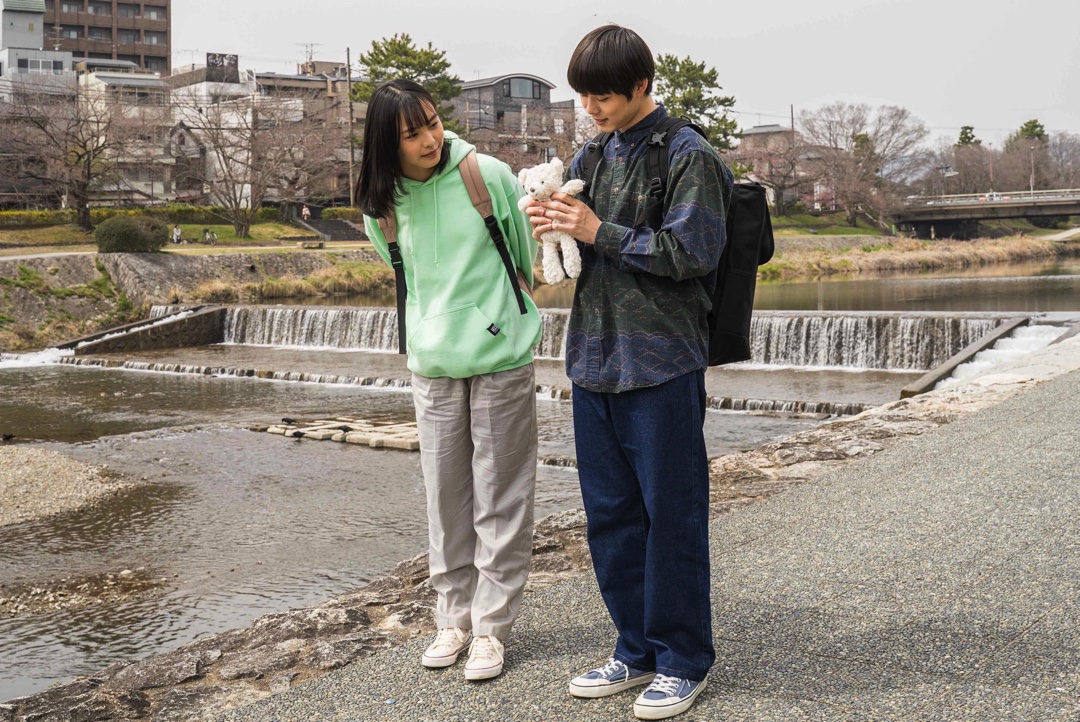
ー In the film’s advertising, words such as “allomantic” were not used, were they?
Kaneko: Yes, I do. Of course, there are people who can be saved by having words and definitions, and I think they are necessary because they serve to make society more aware of the existence of minorities, but I think it is possible to be typecast by words.
That’s why I didn’t want to name the state of Nanamori. I am glad that I was able to give existence to Nanamori’s unique conflict, which is messy, blurred, and formless.
Everything has different elements living together. There are connections between seemingly different things. Director Kaneko’s fundamental gaze
ー I also remember that you incorporated the viewpoint of Plushies in the film as if it were a natural part of the film. It is a direction that is typical of director Kaneko, who has been conscious of non-human existence in his past works “Strolling Plants” (2019) and “Sleeping Insects” (2020).
Kaneko: It is true that we were discussing the perspective of the Plushies on the premise that there would be a “noi perspective” in the camera split, rather than trying to incorporate it. When I met with Yuko Hirami, the cameraman, we naturally talked about what to do with the “Nui point of view. We had worked with Ms. Hirami on our previous film, “Sleeping Insects,” so I think we had a common understanding.
ー There are several scenes in the movie where you wash Plushies, but those scenes do not exist in the original work, do they?
Kaneko: That was an idea based on my own experience. I have a stuffed dog named Lazarus at home, and when I first met him, he was very dirty. So I washed it myself, and the fluffy lump suddenly became heavy as a stone. That was what I remembered.
The act of “talking to a Plushies,” which is also in the title of the film, sounds fluffy when you just hear the words, but it actually has a nuance that makes you feel as if you are falling down with a thud. We thought we could express these elements in the scene where the Plushies are being washed. I also wanted to add a scene in which the Plushies are cared for.
ー I see.
Kaneko: I am also aware that everything is two sides of the same coin and has different aspects. It is the same with a light and fluffy Plushies that becomes heavy like a stone, or the scene in the past work “Sleeping Bugs” where a night bus turns into a little bug and flies away. In this way, I like to find unexpected connections between seemingly completely different things. …… or rather, …… I “know” that kind of feeling (laughs).
ー So it was a feeling that was installed in you from the beginning (laughs).
(laughs): It is difficult to put into words, but I think that all objects and people have opposite elements living together. Birth and death are all connected somehow. I wanted to express that sense in the film.
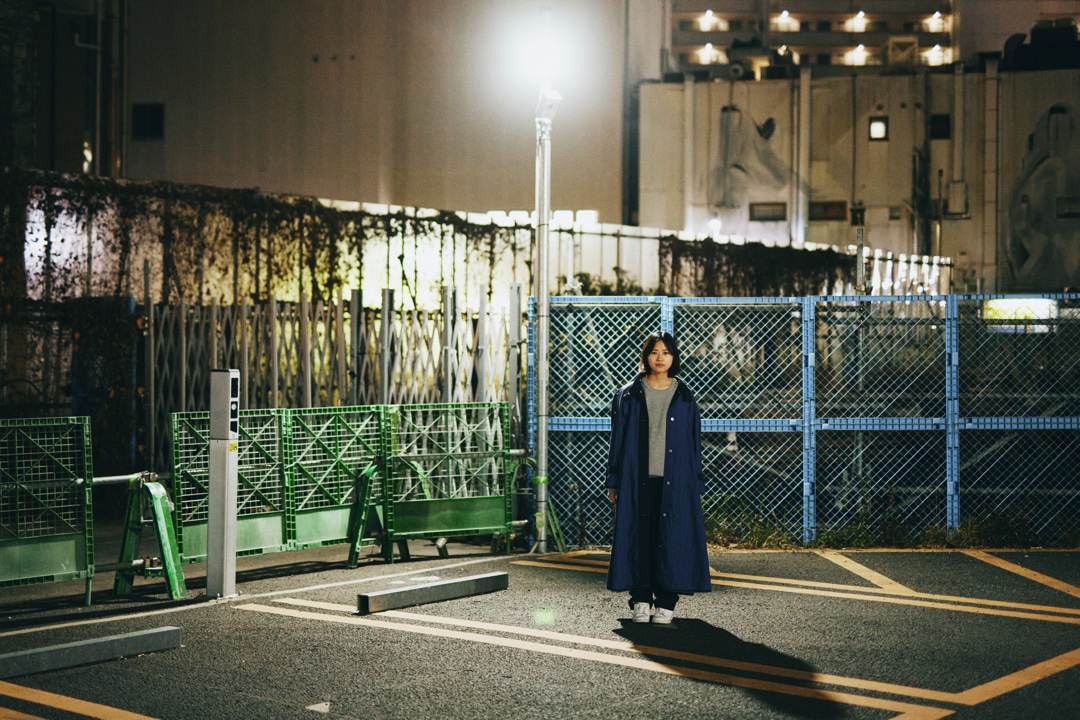

ー I don’t know if it is connected to that sense, but when I saw the air bubbles coming out of the Plushies in the water, I thought the act of washing them was like “baptizing” them. Like throwing away an old life and giving it a new life.
Kaneko: That is exactly what I was thinking about in the latter half of the film when Nanamori washes the Plushies after returning from his parents’ house. Not only the Plushies, but also Nanamori himself is washing away the unpleasant parts of himself.
The scene in which the Plushies are washed was also intended in various other ways. In one scene, I wanted to express the small solidarity between the characters, and in another scene, I hoped it would be a time to genuinely observe the Plushies.
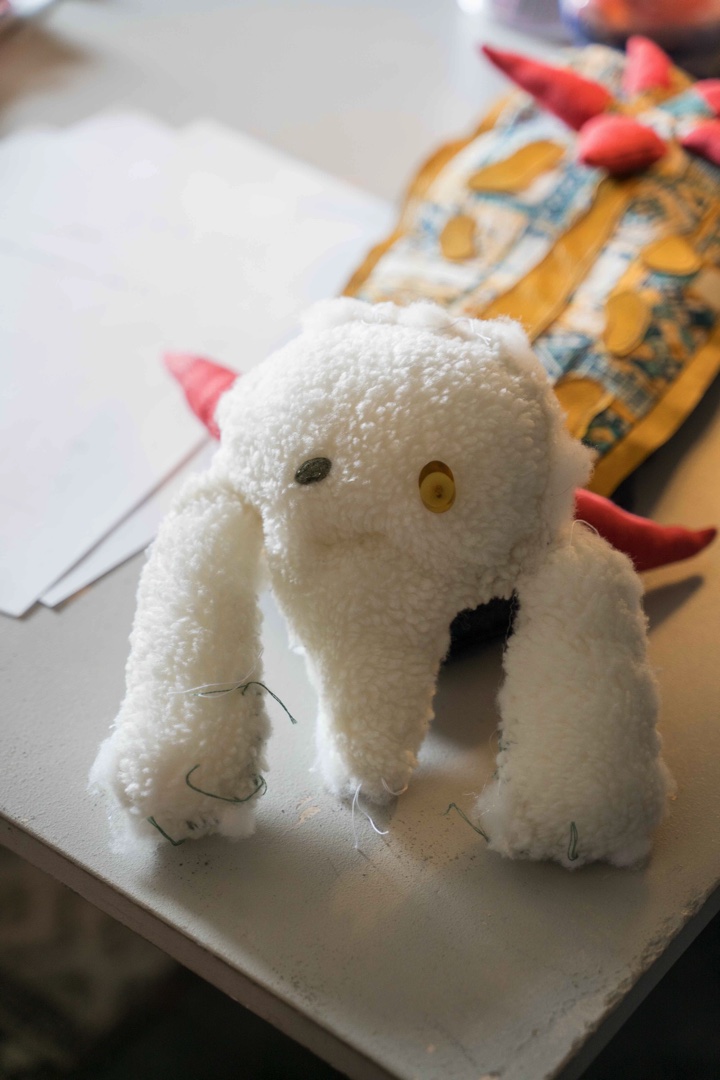
Just like their voices and the way they talk, no one can imitate another person’s kindness. I thought about “kindness” through “Nuishabe”.
ー Lastly, please tell us about “gentleness,” which is also included in the title of your film. Through the novel and movie “Nushishabe,” I wondered if my words, actions, and behaviors that I considered “kindness” were not being forced upon others. I became more and more confused about the definition of gentleness. What did you think about “gentleness” in the process of working on this film?
Kaneko: I believe that the beginning of gentleness is to nod in agreement with the fact that the person exists. From there, it branches out to create various forms of gentleness. In the case of the characters in “Nushishabe,” there are people like Nanamori and Mugito-chan who show their kindness, and there are people like Shiraki who do not show their kindness all the time, but have the kindness to take on a certain situation.

Kaneko: Just as each person has a different way of speaking and different mannerisms, I think there is a kindness that only that person who has grown up in a certain environment can embody. There are many different kinds of kindness that a person has received over the years. So I don’t think I can ever imitate someone’s kindness. …… but even as I talk about it, I am becoming confused. What is kindness?
ー It is difficult, isn’t it? But what the director just said about “environment” reminded me of the “Plushies Circle,” a group of people who talk to stuffed toys. Nui-sa” was described as “a place where people can gather together in a depressed state,” and I have a feeling that being able to share one’s depressed state with others could lead to gentleness.
Kaneko: Yes, that’s right. Weakness” is based on superiority or inferiority and comparison, and while a world without such things would be ideal, I also wrote in my comment on the film that I wondered if there was a place where weak people could live as weak as they are. I wondered what a society where people are expected to be strong would be like.
In many stories, there is a basic pattern of overcoming difficulties and maturing through overcoming them. There is an enemy, you defeat him, and so on. But I don’t think you really have to overcome anything.
With the progress of neoliberalism, society has become more and more inclined to say, “You have to solve your own problems” and “You have to be strong,” but I think, “Why don’t you just go back to sleep? I think so.
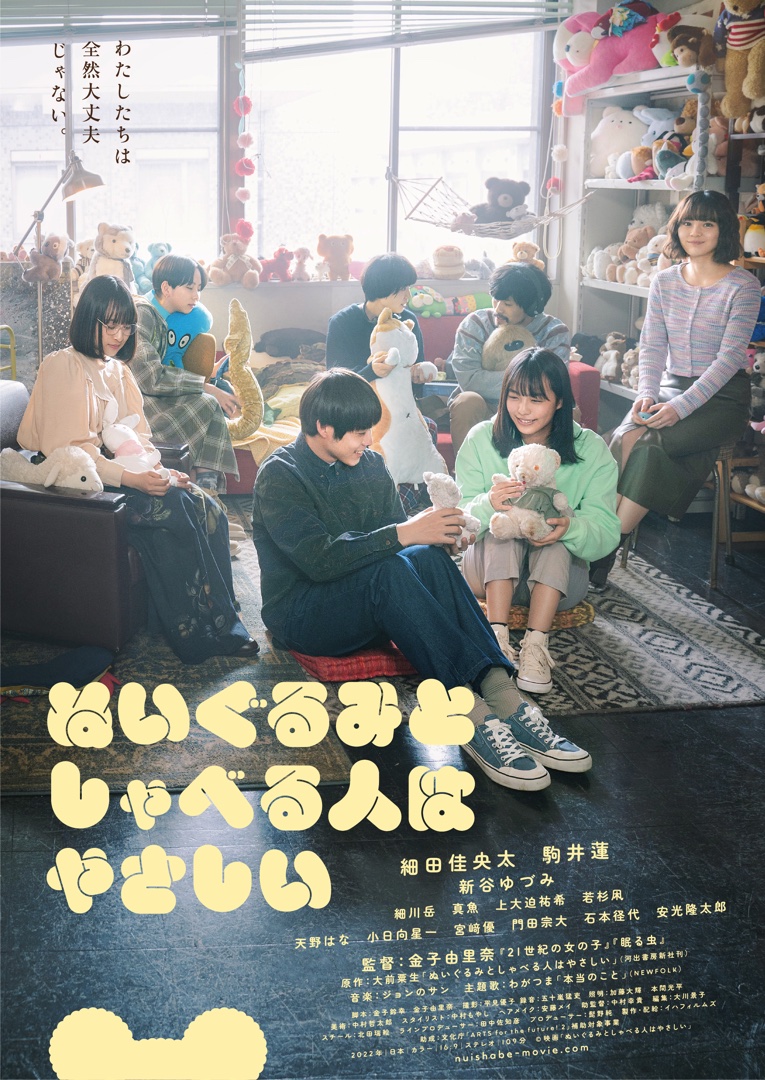
ー It is true that recently, I have felt a mood in which the idea of self-responsibility, such as “I take care of my own moods,” is regarded as a good thing, and I have also seen scenes in which this idea is directed toward others as “harshness. It is precisely because we live in such an era that some people may be saved by coming into contact with people who “remain not okay” in “Nushishabe.
Kaneko: Yes, rather than saving them, it is more like the film is calling out to them, “It’s okay to stay as you are (holding out both hands in front of them). That is what I am saying to myself.
It seems to me that being a director is also a job for people who show leadership and can express their own opinions, but I think it is okay for there to be people like myself who make films with the help of everyone else. Even on the set of “Nuishabe” I kept reminding myself of this as I was inconveniencing everyone. As a result, it really turned out to be a “Nuishabe” kind of scene.
ー That is a wonderful episode. The members of “Nui-Saa” were expressing their feelings that they could not easily express to others to Plushies.
Kaneko: In my case, I think I entrust my feelings to my creations or words. Every day I am tormented by a sense of helplessness, but somehow I am able to keep myself from falling to the bottom through output. In this way, creation may be a grounding point for me with the world.






